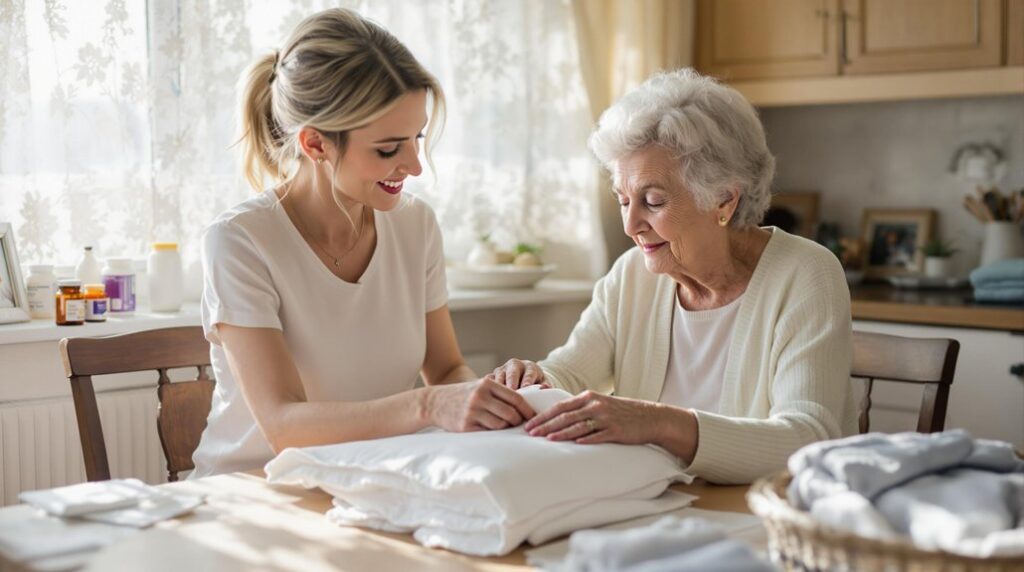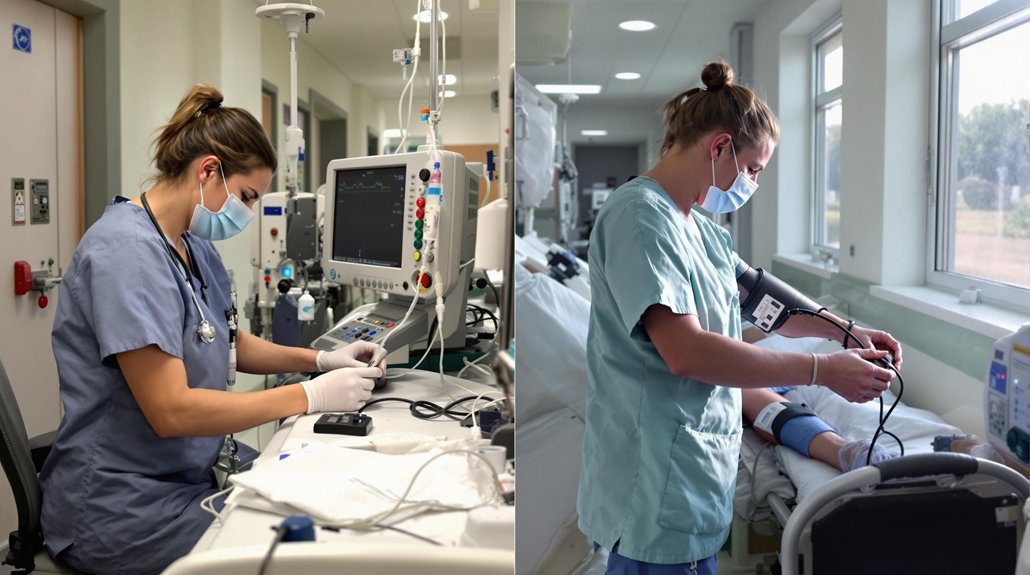Non-skilled home health care includes vital daily support tasks that don’t require medical training. You’ll find companions and personal care aides helping clients with bathing, dressing, grooming, and meal preparation. They also assist with light housekeeping, transportation to appointments, and running errands like grocery shopping. These caregivers provide critical emotional support and guarantee a safe living environment. Understanding these services can help you make informed decisions about your loved one’s care needs.
Defining Non-Skilled Home Health Care
Home companions and personal care aides represent the core of non-skilled home health care – a level of in-home assistance that doesn’t require medical training or certification.
When you provide non medical services as a caregiver, you’ll focus on helping clients with their everyday activities and basic needs. Your role involves supporting individuals who need assistance but aren’t requiring specialized medical care.
Providing non-medical care means being there for daily routines, offering vital support without clinical expertise.
You’ll help with tasks like meal preparation, light housekeeping, transportation to appointments, and personal hygiene. While you’re not performing medical procedures, you’re offering essential caregiver support that helps clients maintain their independence and quality of life at home.
Think of non-skilled care as being a trusted helper who guarantees your client’s daily needs are met while providing companionship and emotional support. These services are especially valuable for those managing chronic health conditions or recovering from surgery without needing ongoing medical supervision.
Personal Care and Hygiene Assistance
Personal care and hygiene assistance forms a central part of non-skilled caregiving duties. When you provide this essential care, you’ll help clients maintain their dignity and well-being through daily hygiene routines and personal grooming activities.
- You’ll assist with bathing assistance, including helping clients safely use the shower or tub, providing sponge baths when needed, and ensuring proper water temperature and safety measures.
- You’ll support personal grooming tasks like hair care, nail care, oral hygiene, and skin care.
- You’ll help with dressing and undressing, including selecting appropriate clothing and managing buttons, zippers, and other fasteners.
- You’ll assist with toileting needs, including helping clients use the bathroom, managing incontinence care, and maintaining cleanliness.
Your attentive care helps clients feel clean, comfortable, and confident in their daily lives. Focus Family Care provides comprehensive training for caregivers to ensure the highest quality of personal care assistance.
Meal Planning and Preparation
While proper nutrition plays an essential role in maintaining health and well-being, many clients need assistance with their daily meals. You’ll help plan and prepare meals that meet their nutritional needs while respecting their dietary preferences. Working closely with clients or their families, you’ll create meal schedules that accommodate restrictions and favorite foods.
| Meal Planning Tasks | Preparation Support |
|---|---|
| Create shopping lists | Cook basic meals |
| Check food inventory | Follow recipes |
| Monitor expiration dates | Portion control |
| Schedule weekly menus | Clean up after meals |
| Consider dietary needs | Store leftovers |
When preparing meals, you’ll guarantee food safety, maintain proper kitchen hygiene, and organize ingredients efficiently. You might also need to assist with feeding if clients have difficulty eating independently, making mealtime a comfortable and dignified experience. As part of daily living assistance, meal preparation is one of the essential personal care services that helps seniors maintain their independence at home.
Light Housekeeping and Home Organization
Maintaining a clean and organized living space directly impacts a client’s well-being and safety. When you provide non-skilled home care, light housekeeping and organization are essential services that help clients live comfortably in their homes.
Through regular light cleaning and home decluttering, you’ll create an environment that promotes independence and reduces accident risks.
Your housekeeping duties may include:
- Dusting furniture, windowsills, and surfaces to maintain air quality and prevent allergen buildup
- Vacuuming carpets and sweeping floors to eliminate trip hazards and maintain cleanliness
- Organizing daily-use items in easily accessible locations to help clients maintain their routines
- Decluttering walkways and living spaces to guarantee safe mobility throughout the home
These tasks aren’t just about cleanliness—they’re about creating a dignified, safe living environment for your clients. Fall prevention strategies are essential components of home organization, helping seniors maintain their independence while reducing safety risks.
Transportation and Errand Support
Beyond maintaining a clean home environment, many clients need reliable support to stay connected with their community and manage daily tasks outside the house. You’ll help clients maintain their independence by providing essential transportation services and running important errands.
| Service Type | Examples | Benefits |
|---|---|---|
| Transportation | Medical visits, social events | Maintains community connections |
| Shopping | Grocery shopping, pharmacy runs | Guarantees basic needs are met |
| Scheduling | Appointment scheduling, organizing deliveries | Keeps life organized |
When you’re providing transportation support, you’ll drive clients to their destinations, assist with mobility, and help carry packages. You can also handle errands independently, like picking up prescriptions or groceries, allowing clients to conserve energy while guaranteeing their needs are met. This support helps preserve their dignity and independence. Companion care services include emotional support and engaging activities while accompanying clients to their appointments and errands.
Companionship and Social Engagement
As clients age or face health challenges, meaningful social interaction becomes essential for their emotional wellbeing.
You’ll provide crucial companionship services that help combat loneliness and isolation while offering emotional support through engaging activities and conversations.
- Participate in indoor social activities like card games, puzzles, or crafts that stimulate both mental engagement and interpersonal connection.
- Listen attentively to their stories, memories, and concerns, helping them process their thoughts and emotions.
- Read books, newspapers, or magazines aloud, sparking discussions about current events or shared interests.
- Assist with letter writing, video calls, or social media to help them stay connected with family and friends.
These companionship services create a supportive environment that enhances your client’s quality of life and emotional stability.
Medication Reminders and Daily Routines
The structured support of medication reminders and daily routines forms a critical foundation for your client’s wellbeing and safety. As a non-skilled caregiver, you’ll help maintain your client’s medication schedules by providing timely reminders and guaranteeing they take the right medications at prescribed times.
Your role includes organizing daily activities and creating predictable patterns that give your client a sense of security. You’ll offer routine reminders for meals, hygiene tasks, and important appointments. By establishing consistent schedules, you help prevent medication errors and reduce anxiety about forgotten tasks.
You can use simple tools like medication organizers, calendars, or checklists to track activities and make sure nothing is overlooked. This structured approach helps your client maintain independence while receiving the support they need to manage their daily responsibilities safely.
Safety Monitoring and Fall Prevention
While providing non-skilled care, safety monitoring and fall prevention become your most vital responsibilities.
You’ll need to conduct regular safety assessments and stay alert to potential hazards that could harm your client.
To effectively monitor safety and prevent falls, focus on these significant actions:
- Remove tripping hazards like loose rugs, electrical cords, and clutter from walkways and high-traffic areas.
- Guarantee proper lighting throughout the home, especially in hallways, bathrooms, and stairwells.
- Report any changes in your client’s mobility, balance, or fall risk to your supervisor immediately.
- Help your client use assistive devices correctly, such as walkers or canes, and make sure these aids are always within reach.
Your attentiveness to these safety measures helps maintain your client’s independence and well-being.
Care Coordination With Family Members
Working alongside family members strengthens your ability to provide extensive care beyond basic safety measures.
You’ll need to establish clear family communication strategies to keep everyone informed about the client’s daily routines, medications, and changing needs. This includes regular updates through phone calls, text messages, or care journals.
Make sure you’re familiar with caregiver support resources in your community to help family members who may feel overwhelmed. You can connect them with local support groups, respite care services, or educational workshops.
Creating a shared calendar for appointments and maintaining an organized care plan helps everyone stay on the same page.
Remember to document all interactions and care decisions, ensuring that both you and family members have access to important information when needed.
Conclusion
Non-skilled home care helps make daily life easier when tasks become hard to handle on your own. Think of it as having a caring friend nearby who can help with everyday activities like taking a shower, cooking meals, or keeping your home clean and organized. These caregivers bring warmth and friendship into your home while helping you stay independent.
You don’t have to face daily challenges alone. Having someone there to lend a helping hand can brighten your day and give you and your family peace of mind. At Focus Family Care, we understand that asking for help isn’t always easy, but we’re here to support you every step of the way.
If you or a loved one need help, don’t wait. Reach out to Focus Family Care today at (561) 693-1311 or email us at info@focusfamilycare.com.



